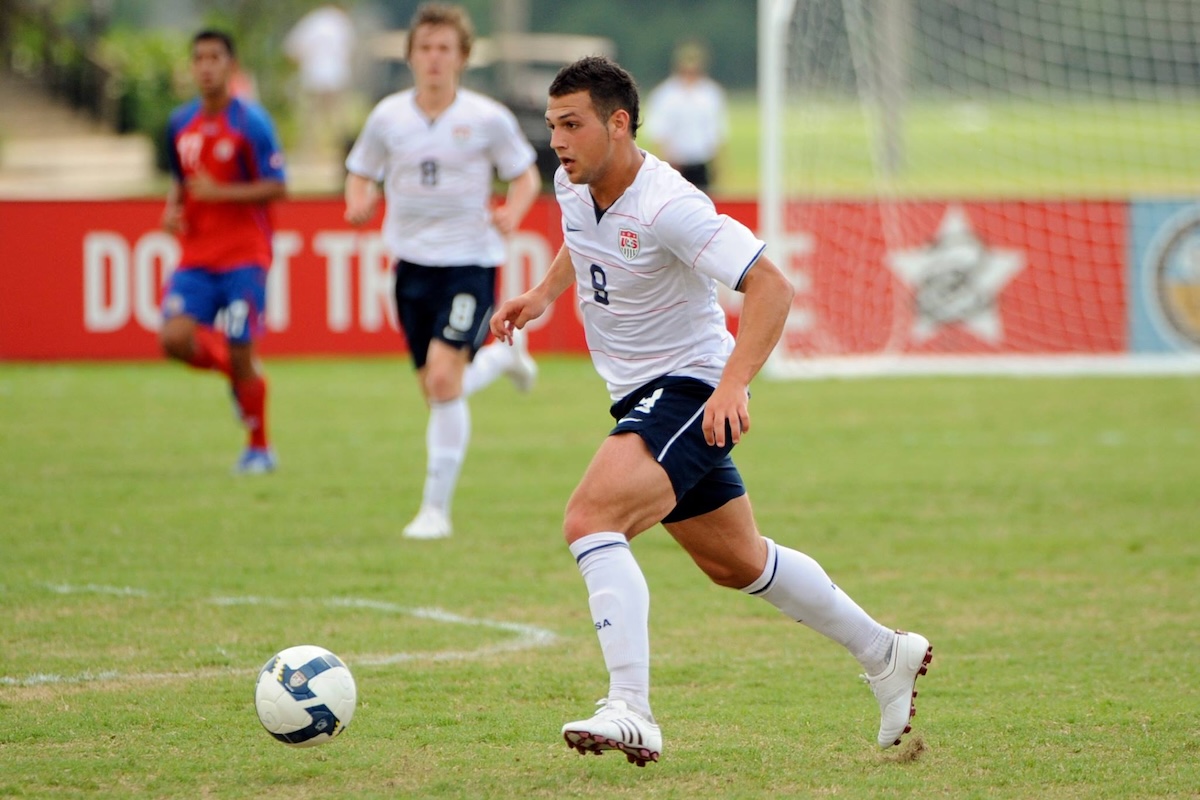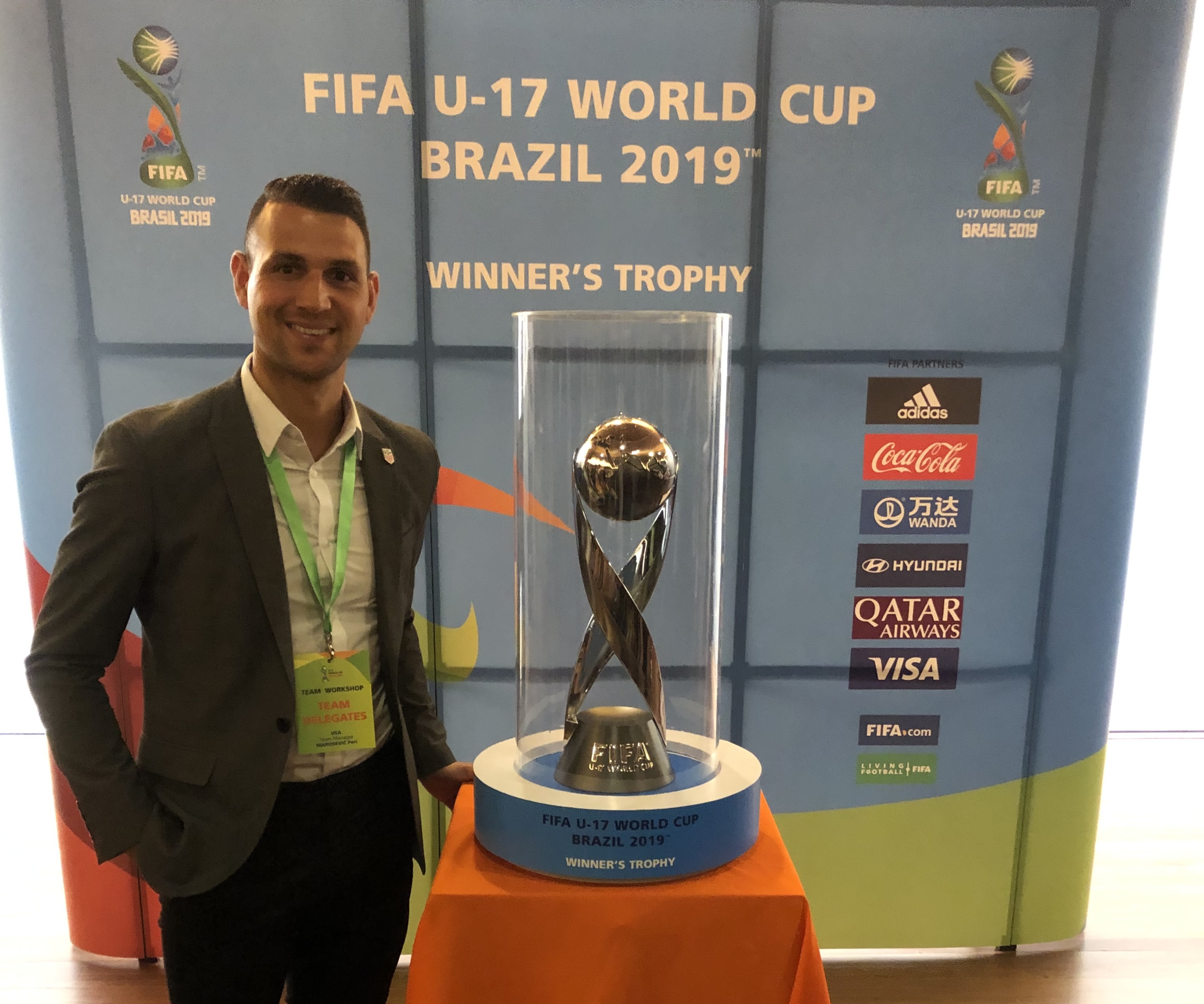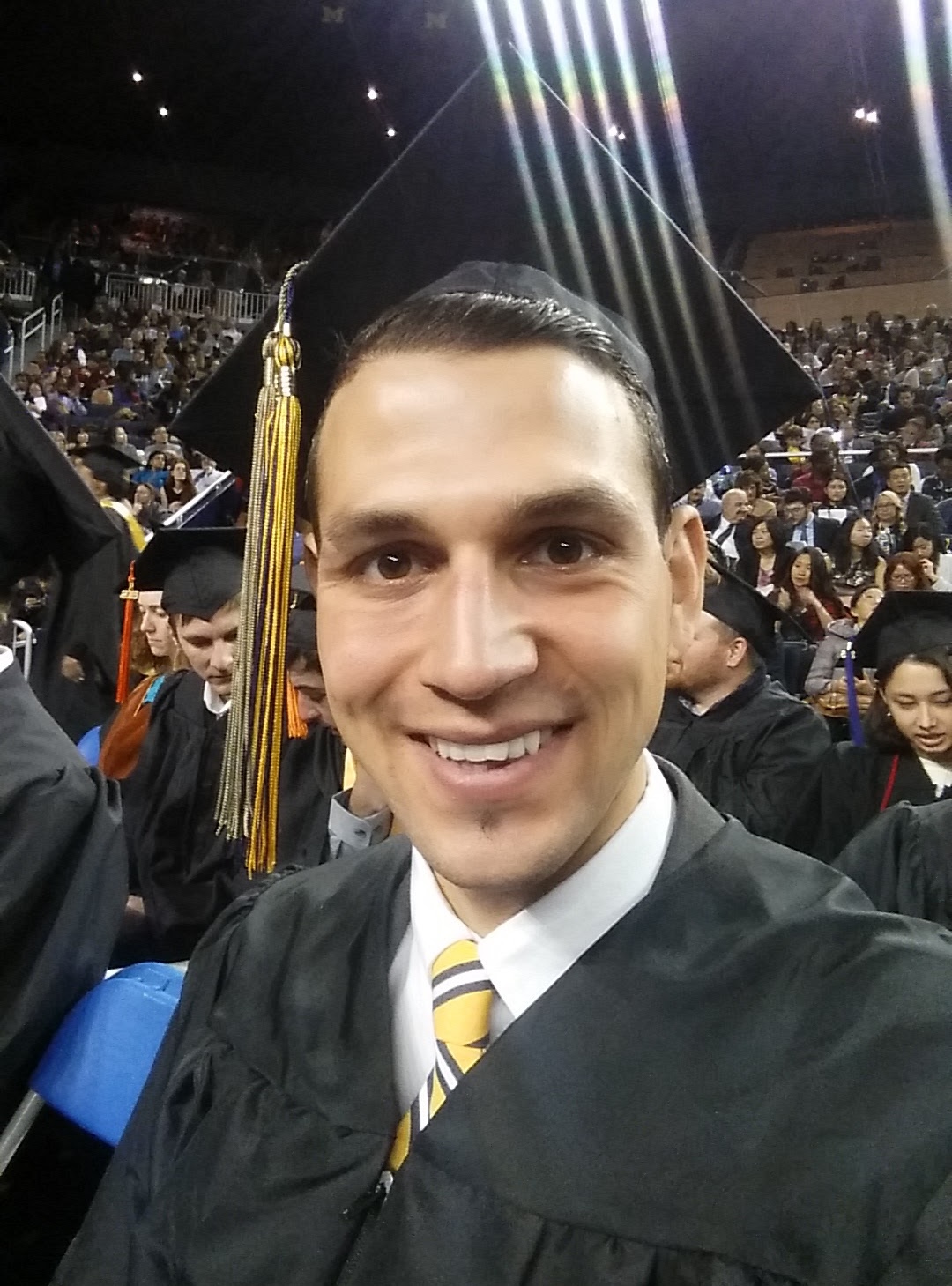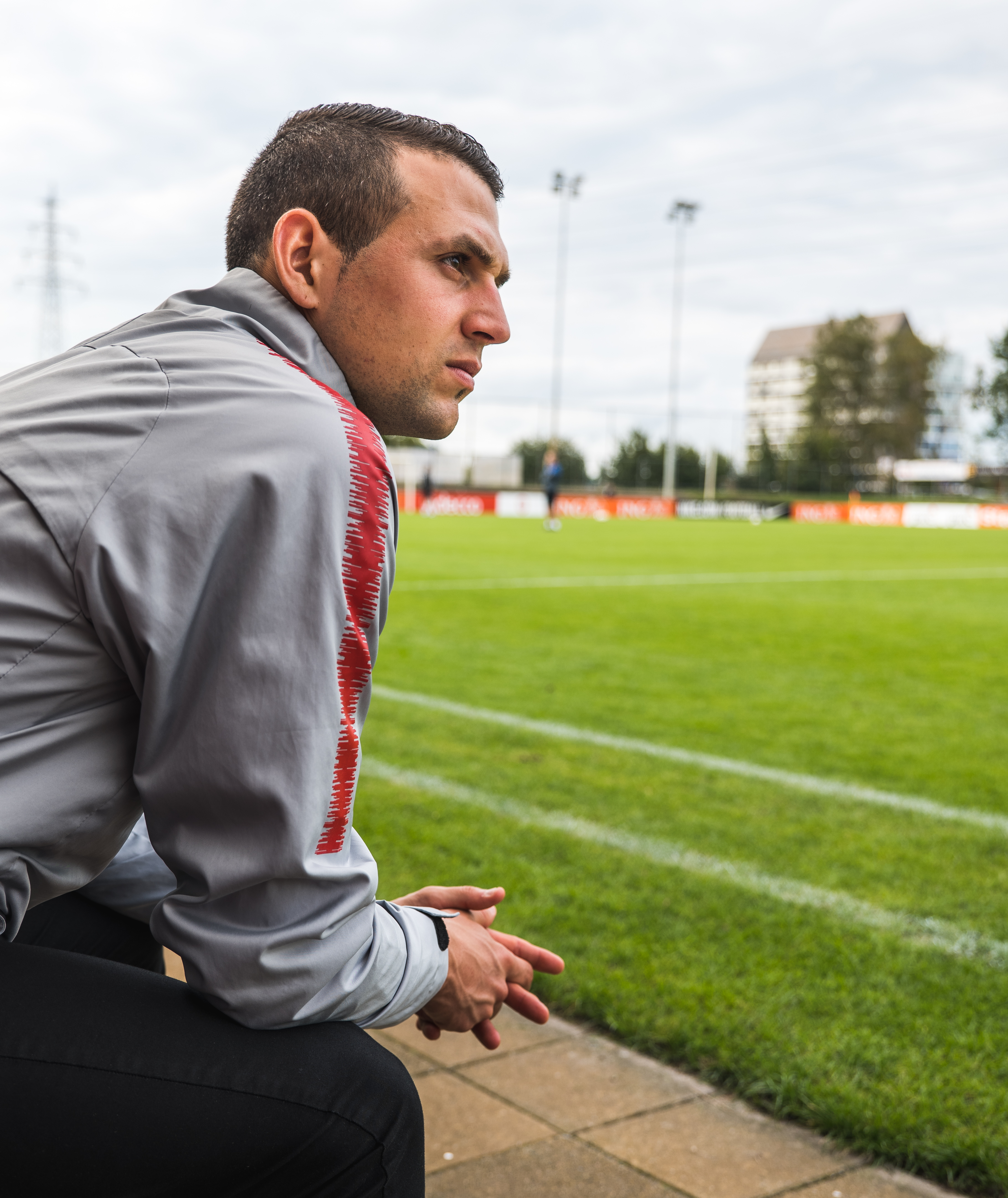
 Back to News
Cool Jobs
Back to News
Cool Jobs
The sport that gave him everything

Through three countries and three languages, a soccer ball was Peri Marosevic’s sole constant.
As a toddler in Brcko, Yugoslavia, his first word was “lopta,” Croatian for "ball." By the time he was 5 years old and living in Frankfurt, Germany, soccer had his heart. At age 14 in Florida, the sport became his life.
The Marosevic family escaped the Bosnian War by a matter of months. Their youngest, Peri, was 2 years old when his parents moved him and his sister, Ivana, to Frankfurt. Anto, Peri’s father, found jobs in carpentry. His mother, Goja, worked as a cashier at a grocery store.
In 1998, when Peri was 9, they settled near Chicago.
“I didn’t really understand too much of what was going on,” he says. “I don’t know if I even fully realized where it was or how far away it was. All I knew was, we had the opportunity to move to the United States.”
And he knew soccer. In the Balkans, in Germany, and in America, too, Marosevic relied on the game for equilibrium.
“At a very early age, I realized that this game brought me a lot of joy and happiness,” he explains. “It challenged me. It was important to me and something I wanted to continue doing.”
Skip ahead 26 years to present day. Marosevic is a senior manager of soccer growth at U.S. Soccer. He played professional soccer for six years. He earned a sport management degree from the University of Michigan on a full-ride scholarship. He represented the United States on five youth national teams.
“I loved the atmosphere, the passion, and watching players do amazing things with the ball,” Marosevic explains. “I wanted to emulate them, and that turned into ‘I want to be them.’ I stayed dedicated. I stayed focused. That work got me to where I am today.”
Foot in the door

On the precipice of high school, Marosevic accepted an invitation to the U.S. Soccer Residency Program in Bradenton, Florida. He had worked for years for a break like this — the young player had grinded in the Olympic Development Program, representing the state of Illinois and later his wider region as he continued to be identified for bigger and better things. It culminated in an opportunity 1,000 miles south.
This move, his third in 14 years, left behind his family, his only common denominator outside of soccer in prior relocations. In Florida, it was just the sport he loved.
But it was also the world.
He spent much of the next few years traveling to different continents while playing soccer through U.S. Soccer. It provided an education beyond the field.
“I got to see how soccer runs in different parts of the world,” Marosevic said. “I knew it was big, but actually seeing it with my eyes in countries like Egypt, Brazil, Argentina, Germany, Spain, Portugal – some really big soccer nations – it opened my eyes."
The residency program connected him with players, coaches, and administrators throughout U.S. Soccer and across the United States. He built a network without noticing.
In 2015, after his professional sporting career had ended and he’d earned his degree, Marosevic drew back on all those years growing up in U.S. Soccer.
“During that job search, I had this idea in my head,” Marosevic says. “‘How cool would it be to work for an organization that invested in me before?’”
He looked into Adidas; after his junior year at Michigan, Marosevic had been given a coveted Generation Adidas contract, a guaranteed MLS deal that also promised the league would pay for any continued education. He considered MLS; Marosevic was the No. 5 pick in the 2009 MLS SuperDraft and appeared in 11 MLS contests across three seasons. And then there was U.S Soccer, the entity that sent Marosevic to international stages abroad and unearthed what was possible.
“I talked through my network and was able to get connected,” Marosevic explained. “Those connections led to a conversation, which led to an interview, which led to a job offer. I was excited that it was U.S. Soccer. It fell in line with this idea of working for an organization that invested in me before and a way to give back.”
The climb

Marosevic helped manage the U.S. Soccer Development Academy, the federation’s youth league, and support its clubs in his initial role in 2016. Through slow, steady steps, he rose up the lineup, coordinating youth national team programs, managing technical operations, and now developing strategy for soccer’s growth in the country. With each new job, he backed further from street view and surveyed the larger landscape of the sport.
“When I first joined U.S. Soccer, I was trying to solve the problems on the ground,” Marosevic said. “I still do that in my current role but on a bigger scale. My goal from the beginning was to make an impact — doesn’t matter how big or small — and this role that I’m in now gives me the opportunity to tackle some of the biggest challenges, allowing me to possibly, and hopefully, have a bigger impact on soccer in this country.”
The years he played and experienced soccer beyond American borders have proved useful in his current role. For instance, an integral aspect of his job now is benchmarking.
“I’ll look at what other soccer nations are doing in the space,” he said. “How are they tackling these challenges, what are their standards, what are their best practices.”
His education from U-M’s School of Kinesiology supplied him with tools he relies on often at U.S Soccer, Marosevic says. Courses he took in marketing, finance, sport law, sport business, public speaking, and, of course, sport management professor Stefan Szymanski’s class on soccer, all chip in.
“I have to work with the marketing team as the sponsorships are sometimes tied to the projects we work on,” he explains. “I work with our finance team to set and manage budgets for the national teams as well as the technical development department’s budget. I have to understand the laws behind the game and how clubs and leagues operate to better serve our members. And I have to speak and present in front of my team, plus to internal and external stakeholders on a regular basis.”
Research and conversations with members of other federations is a standard part of Marosevic’s work. So is collaborating with other National Governing Bodies, like the USTA, USA Basketball, and USA Hockey, and talking with key U.S. Soccer stakeholders, including the many clubs, leagues, and members that drive soccer in America.
“I have a lot of meetings with stakeholders to understand the reality of soccer in this country,” he explained. “Everything from grassroots to the professional environment. For us to make a positive change, we need to know first what is happening across the soccer ecosystem. Our team is developing solutions to some of the biggest challenges out there, but to do that, we need to first listen.”
Michigan in the middle

That was a lesson Marosevic learned from his mother, particularly in high school, when he had to make a crucial decision about his future.
In his early days at the residency program, Marosevic wasn’t sure if attending college or turning pro would be the right move once he graduated. His mother gave him the answer.
“Education was always important in our family, and to my mom in particular,” he said. “She was the one who always drove that into my sister and me. Yes, you can play sports, you can play for a certain amount of years, but you have to look ahead at the bigger picture.”
Plenty of prestigious schools with successful men’s soccer programs lined up to court Marosevic: Brown University, UCLA, Indiana University, University of Illinois Chicago. One stood out.
“I received a letter of interest saying Michigan would watch me play, followed by a few phone calls,” he recalled. “It was the letter with the big yellow ‘M’ on it that first got me interested.”
Marosevic had multiple conversations with U-M head coach Steve Burns (MS '98) and assistant coach Paul Snape and kept liking what he was hearing. As an upperclassman in high school, he took a visit to Ann Arbor that convinced him. The clincher was eight words that Burns wrote.
“All four years, 100% paid, a full ride,” Marosevic said. “That hit me. It was very important to me that my parents did not have to pay for my education, and Michigan made that happen.”
For three years, the attacker attended classes and scored goals at Michigan — 24, to be exact, tied for the fourth-most in program history. After a First Team All-Big Ten nod as a junior, Marosevic was presented with an offer he couldn’t refuse: Major League Soccer’s Generation Adidas contract.
The opportunity gave Marosevic the confidence to try professional soccer while putting his degree on hold. He vowed to his family, his coaches, the university, and himself that Ann Arbor hadn’t seen the last of him.
By 2015, Marosevic had competed in 11 MLS games; spent some time on loan at a lower league team; played in Croatia, and won a North American Soccer League title with the New York Cosmos, a professional team that was then in the tier directly below the MLS. He felt it was time for him to make good on his promise to complete his degree.
Marosevic spent that year in Ann Arbor. It was the first time in his life that he made camp at a known site. He acted as an assistant for the Michigan men’s soccer team as he completed his sport management degree with honors. Graduation day remains one of his proudest moments.
“I’m the type of person who likes to finish what I started and do it right,” Marosevic said. “I made a commitment to the university when I signed my admission paperwork. I made a commitment to the men’s soccer program when I stepped on the field for them. I made a commitment to my parents, particularly my mom, that I would get that degree. And not just any degree — a Michigan degree. Ultimately, I made a commitment to myself that I wanted this. This school meant a lot to me and gave me a lot in return, so this was a way to close the loop on an incredible journey.”
Finding stability

The U.S. Soccer job after graduation meant packing up for Chicago, reuniting Marosevic with his family for the first time in 13 years.
He’s stayed ever since. It’s been eight years of stability, the longest Marosevic has ever lived in one place. That’s better for him now — he and his wife love trying Chicago’s eclectic food, and his parents are a reasonable drive away.
Soccer did this. From birth to adulthood, the sport has been Marosevic’s guide, escorting him over borders and oceans, extending camaraderie, livelihood, and education.
“I have seen those who do not have much but still find happiness in the environments they’re in,” Marosevic explained. “I’ve also seen those who do have give back to the community to share that happiness. I have experienced different cultures, food, backgrounds, religions, languages, and stories. I believe you learn in two ways: from your own experiences, and from the experiences of others. Soccer exposed me to that.”